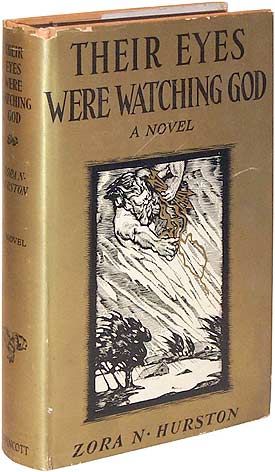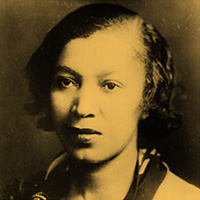|
Theme of Self-Discovery in Chapter 9 of |
|
|
|
In chapter nine of Their Eyes Were Watching God, we see a theme of self-discovery. Janie enters a road to find herself as she realizes that she has different dreams than the ones that have been imposed upon her. Her retaliation against the obtrusion of outside forces gives her a better understanding of who she really is. Janie realizes that Joe’s death frees her from the years of repression she experienced as his wife. Janie’s strength shows through when she does not allow what others in the community think about how she should mourn dictate her actions. She also recognizes that her goals in life are drastically different than the goals her Nanny had in mind for her. Through Janie’s decision to gain control of her own life, we see her starting to define her desires in this chapter and it sets the stage for her self discovery throughout the remainder of the novel.
In the opening pages of chapter nine, Janie realizes that Joe’s
death has freed her from the years of repression she suffered as his wife. After attending Joe’s funeral, “she burnt up every
one of her head rags and went about the house next morning with her hair
in one thick braid swinging well below her waist” (89).
The burning of her head rags is symbolic of her retaliation
against the identity Joe imposed upon her. Janie’s
actions indicate that she recognized Joe’s attempt to suppress her female
sexuality. She knew that Joe was jealous of her
beauty and he wanted to hide it by covering her hair. Not
only was Joe attempting to conceal her appearance, but he was robbing Janie
of her existence by taking her control of her own body away from her.
Janie’s immediate decision to wear her hair down following his
death demonstrates her unwillingness to accept his oppression. Janie discovers that her youth and beauty had
been hidden under those head rags and she decides to free herself of Joe’s
constraints by destroying them. Janie defines her desire for freedom
by asserting control of her own body. She begins uncover all of the
life that had been resting silently below the surface.
Janie’s efforts to define her identity also presents itself
when she does not allow what others in the community think about how she
should mourn dictate her actions. After Joe's
funeral, Janie says to one member of the community, “Tain’t dat Ah worries
over Joe’s death, Pheoby. Ah jus’ loves dis freedom”
(93). She admits out loud that she enjoys freedom
from Joe, and she isn’t in a hurry to replace him. Her
statement is concerning to Pheoby because Pheoby knows that the community
would disapprove of Janie having any enjoyment while she should be mourning. Janie’s strength bespeaks itself when she says “Let
‘em say whut dey wants tuh, Pheoby. To my thinking
mourning oughtn’t tuh last no longer’n grief” (93).
Janie’s response to Pheoby is a clear indication that she aims
to take control of her life away from the community and to put it back into
her own hands. She could care less about how
they think she should mourn, she is ready to speak and act according to her
own wishes. Janie defines her identity
through her conversation with Pheoby as she comes to an understanding about
herself and her inner-strength. She realizes that she can and should express
her true feelings whether people in her community can appreciate them or
not, because she is the one in control. In chapter nine, Janie also realizes that her goals in life are incredibly different from what Nanny had in mind. She comes to realize that deep down in her heart she hated her grandmother for imposing her dreams on Janie. Nanny’s goals were in direct conflict with Janie’s desires. Janie discovers that “Nanny belonged to that other kind that loved to deal in scraps” (89). Unlike Nanny, Janie wanted to be someone who “could look at a mud puddle and see an ocean with ships” (89). Janie wanted to live life to the fullest. She begins to recognize her inner need to escape emptiness. Like Joe, Nanny had tried to take control of Janies dreams by, "[pinching] it in to such a little bit of a thing that she could tie it about her granddaughter's neck tight enough to choke her" (89). Nanny forced her to enter into a relationship where her female sexuality was suppressed in a marriage that did not contain love. Nanny's choices for Janies life was based on the fact that she was a slave and was unable to have control her own life. It is ironic then, that Nanny would repress Janie's goals when she herself had resented such repression.. The image of Nanny choking Janie is a strong indication that Nanny's attempt to control Janie's life was in fact suffocating her. Janie's decision not to "tend to her grandmother's grave" (89) demonstrates her eagerness to take control away from Nanny. She defines her identity by asserting her right to be in command of her life.
Through Janie’s decision to pursue her own dreams, she
defines who she wants to be. Janie is a woman who has come to discover herself through the realization that what other people want for her life is very different from her own goals. In chapter nine, she recognizes that Joe had repressed her identity by making her wear head rags, so she decides to burn them. She also recognizes that she is strong enough to rebel against her community by speaking what she thinks rather than saying what they think she should say. Janie comes to understand that her Nanny was imposing on her identity by “dealing in scraps” (89), but she is willing to go against her Nanny’s wishes to see ships in mud puddles (89). She salvages control of her life begins her road towards self discovery.
|

